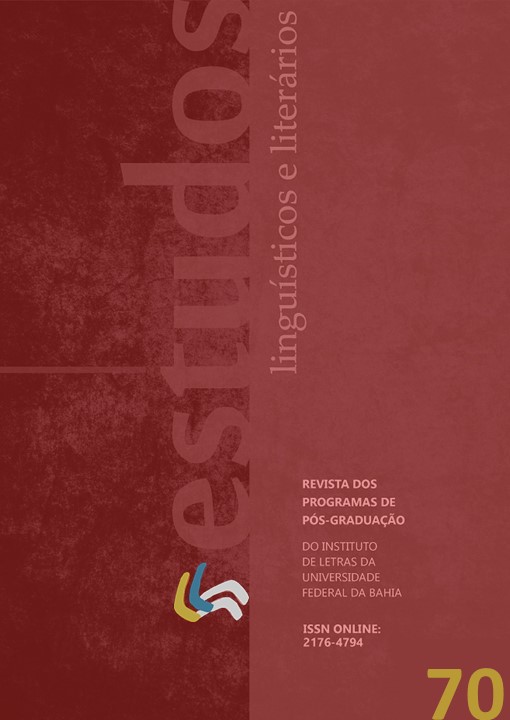CONTEMPLATING RUBBLE IN THE FUTURE: THE HISTORICAL MEMORY COATED IN FICTION IN THE HANDMAID'S TALE
DOI:
https://doi.org/10.9771/ell.i70.43689Keywords:
Comparative literature, Dystopia, Memory, Feminine roleAbstract
This study seeks to analyze the dystopian novel The Handmaid’s tale, [1985] (2017), by Margareth Atwood, as a literary genre that presents memory traces and articulating discussions about literature, memory, and history. The aims are to study the association between memory and dystopia based on the argument that dystopian novels are ways of resuming tradition and to problematize the social and political risks of this resumption and the cultural resignifications matter arising from it, which affect the identities formation field. In this study, we propose to make some reflections on the past traces relocated in the fiction form and set in a post-apocalyptic future in the novel, mobilizing the anthropological concept differential valence of the sexes and the memory concept to establish some comparative paths between the novel characters and some biblical archetypes.
Downloads
References
ARENDT, Hannah. Origens do totalitarismo: antissemitismo, imperialismo, totalitarismo. Trad. Roberto Raposo. 4. ed. São Paulo: Companhia das Letras, 2012.
ATWOOD, Margaret E. O conto de Aia. Trad. Ana Deiró. Rio de Janeiro: Rocco, 2017.
BÍBLIA. Português. Bíblia de Jerusalém. São Paulo: Paulus, 2004.
CANDIDO, Antônio. Literatura e Sociedade: Estudos de teoria literária e de história literária. 8. ed. São Paulo: T.A. Queiroz, 2000.
CLAEYS, Gregory. Utopia: a história de uma ideia. São Paulo: Edições SESC SP, 2013.
DAMATTA, Roberto. Espaço, cidadania, mulher e morte no Brasil. 4. ed. Rio de Janeiro: Guanabara Koogan S.A., 1991.
FERNÁNDEZ PRIETO, Celia. Poética de la novela histórica como género literario. In: Signa. Revista de la Asociación Española de Semiótica. Núm. 5, 1996, pp. 185-201.
FROMM, Erich. Posfácio (1961). In: ORWELL, George. 1984. São Paulo: Companhia das Letras, 2009.
HALBWACHS, Maurice. A memória coletiva. Trad. Laurent Léon Schaffter. São Paulo: Editora Revista dos Tribunais, 1990.
HÉRITIER, Françoise. Masculino Feminino II: dissolver a hierarquia. Lisboa: Instituto Piaget, 2002.
JACOBY, Russell. O fim da Utopia. Rio de Janeiro: Record, 2001.
LE GOFF, Jacques. História e Memória. Trad. Bernardo Leitão et al. Campinas, SP Editora da UNICAMP, 1990.
PESAVENTO, Sandra J. Fronteiras da ficção: diálogos da história com a literatura Discurso histórico e narrativa literária. In: Anais do XX Simpósio Nacional de História – ANPUH. Florianópolis, julho 1999.
PEREIRA, Rodrigo da Cunha. Direito de Família: uma abordagem psicanalítica. 2. ed. Belo Horizonte: Del Rey, 1999.
RICOUER, Paul. Tempo e narrativa. Trad. Roberto Leal Ferreira. Csmpinas, SP: Papirus, 1997. Vol III.
RICOUER, Paul. Le memóire saisie par l’histoire. In: Revista de Letras, Universidade Estadual Paulista, v. 43, n. 02, jul/dez 2003. PP 15-28. Número especial sobre memória e literatura.


